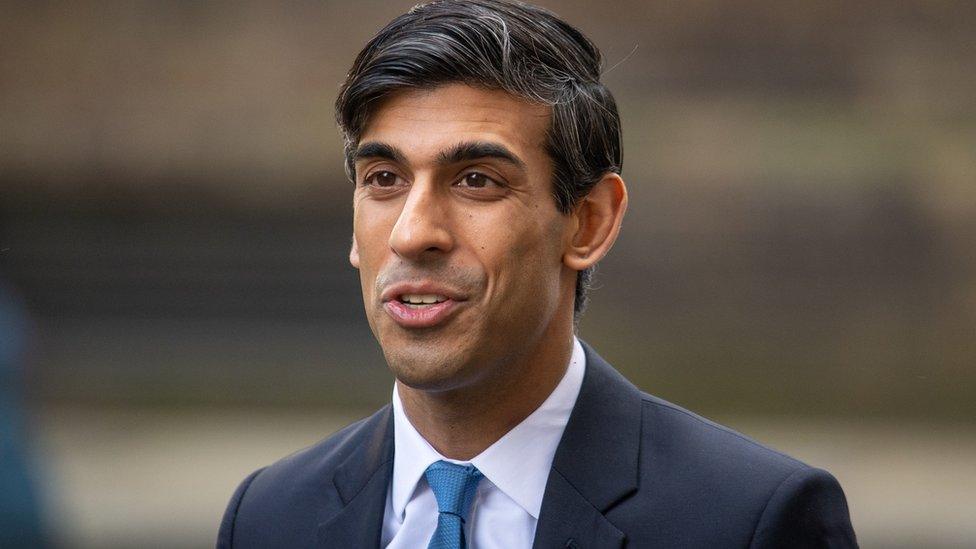Furlough: New job starters 'left behind' despite scheme extension
- Published
- comments

Chancellor Rishi Sunak announced the government's job retention scheme in March
Since the coronavirus lockdown began nearly a quarter of the UK's workforce has been furloughed.
More than six million people are having 80% of their wages, up to £2,500 a month, paid by the government while they are temporarily on leave from their jobs.
But hundreds of thousands of workers have fallen through the cracks because they started new jobs around the time the impact of the pandemic would have started to become clear.
Despite assurances of a "more generous" scheme for new employees, many have been forced to take unpaid leave, seek new work, or explore claiming benefits.
'Government promises are a smokescreen'
When the government's job retention scheme was announced, it was only open to people who had been registered on their employer's PAYE system by 28 February.
But last month the government announced it was extending the scheme to people employed by 19 March.
Campaigner Natalie Greenway, from Hinckley in Leicestershire, said: "At the beginning I looked at it and thought, 'oh great, this means I get to be furloughed now', because I started my new job on 16 March."
But to qualify, an employee will need to have had an RTI (Real-Time Information) submission, or payslip, sent to HMRC.

Natalie Greenway is campaigning to get the job retention scheme cut-off date amended
Many new starters got paid at the end of March and therefore would not qualify for the new extended scheme.
"It's a smokescreen, and a bit of a PR stunt. It isn't a change," Ms Greenway said.
Chief executive of UK Hospitality, Kate Nicholls, said the RTI stipulation could affect between 350,000 and 500,000 people in her industry alone.
She told a Treasury Committee hearing that people who thought they were eligible for the furlough scheme, because they were on their employer's payroll by 28 February, were being excluded because they were not paid by 19 March.
A Treasury spokesperson said employees "always had to be included on an RTI submission" and this was not a new requirement.
'I've barely got any money left for food'

Single mother Jasmin Mayes was made redundant after starting a new job after 19 March
Jasmin Mayes, from Sutton-in-Ashfield in Nottinghamshire, started her new role on the first day of the lockdown.
She had moved from a job at a window supplies company to work at an aeronautics firm.
But the single parent is now waiting for universal credit after her new company made her redundant and her old employer refused to take her back.
She said: "I've done a benefits calculation and if it's correct it will just cover my bills without any food or petrol.
"My child maintenance has now stopped from her dad as he lost his job, so this month we will receive £83.85 in child benefit and that's everything."
Her daughter Elodie is not eligible for free school meal vouchers until the universal credit claim comes through in June.
"What's left now has to last until I'm able to find work again," she added.
'I'm looking for delivery or fruit picking jobs'

Bryn Robinson is not eligible to be furloughed, despite starting his new job before 19 March
Bryn Robinson, from Essex, moved jobs at the beginning of March.
Despite starting his job before 19 March, the father-of-two is another who is not eligible for the government's furlough scheme.
"It's fairly common practise that you get paid at the end of the month," he said.
"I don't think many people will be saved by this, there'll be a lucky few who'll get something. But the monthly paid among us, no."
As a result, he has decided to take a mortgage holiday and has been looking for work as a delivery driver, or fruit picker.
"I'm not willing to work in a supermarket because I don't want to bring a virus home to my family, I'm not going to risk their health," he said.
"It's an employer's market, and it's tough if you're applying for a role outside of your experience."
'I was one of the lucky ones'

Neil Walker and his partner Amanda would have been "facing the financial abyss" if he could not be furloughed
Neil Walker from Hinckley, Leicestershire, began a new job in renewable heating technology on 2 March.
Initially that start date meant he was not eligible for the furlough scheme, but after the date changed he was hopeful he would benefit.
As he is paid in the middle of the month his employer made an RTI submission by 19 March.
"I was one of the lucky ones," the 49-year-old said.
"If I wasn't furloughed I'd be facing the financial abyss, my partner only works part-time and she's been furloughed.
"I think it's so unjust, nobody knew this was going to happen, no-one knew the implications of moving jobs."
'I can't furlough 85% of my workforce'

Richard Potter hired the majority of his staff after 28 February, and as a result they cannot be furloughed
Richard Potter was excited at the beginning of the year as he had set up a new curtain and blinds company with his business partners in Merseyside.
But when non-essential retailers shut their doors, orders began drying up and the start-up had to look at furloughing staff.
"But of the 46 people we employ we can only furlough seven," Mr Potter said.
"We've been unable to pay anybody since the end of March.
"It's terrible from an employer's point of view.
"Do I make them redundant? Do I put them on zero-hours contracts? Being a new business we don't have the reserves to pay them."
Mr Potter said the government's scheme was penalising "people who were moving jobs for the right reasons".
The Treasury said firms could re-employ people who had left so they could be "put back on payroll and furloughed".
But Mr Potter said he had "a lot of sympathy" for ex-employers who would not take people on again because of the future cost implications of making people redundant.
His business's sewing staff have been returning to work to make surgical gowns for the NHS, the sales of which will cover some of his staff's wages.
A Treasury spokesperson said the government's job retention scheme had helped "to pay the wages of more than six million furloughed jobs".
They added by extending the scheme "we have provided support for thousands of extra people, whilst keeping the significant fraud risks under control".

A SIMPLE GUIDE: How do I protect myself?
AVOIDING CONTACT: The rules on self-isolation and exercise
LOOK-UP TOOL: Check cases in your area
MAPS AND CHARTS: Visual guide to the outbreak


Follow BBC East Midlands on Facebook, external, Twitter, external, or Instagram, external. Send your story ideas to eastmidsnews@bbc.co.uk.
- Published30 September 2021

- Published4 May 2020
- Published5 April 2020
